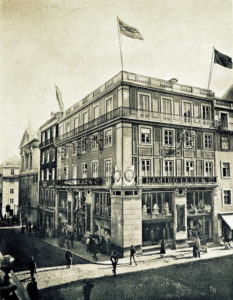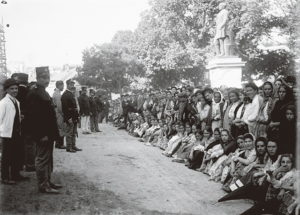‘Just clapping doesn’t solve anything’

Despite the fact that Catarina Martins – the leader of the Left Bloc (BE) – regards the National Health Service (SNS) ‘a pearl of democracy’ and its workers ‘heroes and heroines’, working conditions are poor and staff shortages in public health threatening.
After having reviewed the shortage of doctors in the SNS, let’s now take a look at the field of nursing.

When Portugal froze nurses’ career progression and salaries during the financial crisis some ten years ago, thousands went abroad in seek of greener pastures. There are currently 20.000 Portuguese nurses working elsewhere – mainly in the UK, France, Spain, and Germany – where salaries are easily 3 times higher.

In Portugal, the ratio of nurses/inhabitants is low (6.9/1000), compared to EU countries (9.3/1000). The Independent Union of Nurses recently highlighted the lack of appreciation of the nurses by the Government, leading to another 1300 professionals leaving the country during the Covid19 pandemic.
According to the Nurses Association (OE), there are approximately 45.500 nurses working in the SNS.
‘A general nurse earns 1200 euros per month at the start of her career and will only be evaluated for upgrading every ten years’, says Guadalupe Simões, head of the Portuguese Nursing Syndicate. ‘After tax, some take home as little as 980 euros, just 315 above the minimum wage. Many have two jobs to make ends meet. Even those who have worked a lifetime can only hope to reach a salary of 1800 euros at the end of 40 years’.

The OE foresees further mass emigrations of nurses after an exhausting and unrewarded fight against the pandemic. ‘The Government must adopt policies to keep nurses in the country and that is impossible with low wages’, the outspoken president of the Association – Ana Rita Cavaco – declared. To back their demands a general strike will be called on November 3rd and 4th.
In order to recover the level of primary care damaged by the epidemic and in view of the EU Recovery Plan – aiming to rebuild a more resilient post-Covid19 Europe – the OE proposes the assignment of a family nurse to each family/patient.

‘There are currently 3000 nurses involved in the coronavirus vaccination campaign, which could be considered for this purpose. Family nurses can play a decisive role in the recovery and consolidation of people with chronic illnesses and dependents at home, who are now in a situation of greater vulnerability.’
Enjoy your weekend Bom fim de semana (pic Público/Sapo)






 In the heart of Lisbon – on the Santana hill between the Travessa da Pena and the Beco de São Luis – used to be the clothing manufactory of Ramiro Leão.
In the heart of Lisbon – on the Santana hill between the Travessa da Pena and the Beco de São Luis – used to be the clothing manufactory of Ramiro Leão. Ramiro Leão (1857-1934), born in Gavião moved young to the capital, where he became one of the most powerful merchants and founder of the cosmopolitan warehouse Ramiro Leão & Co (nowadays United Colors of Benneton) in the glamorous Chiado neighbourhood.
Ramiro Leão (1857-1934), born in Gavião moved young to the capital, where he became one of the most powerful merchants and founder of the cosmopolitan warehouse Ramiro Leão & Co (nowadays United Colors of Benneton) in the glamorous Chiado neighbourhood. Since the old factory broke down, it experienced a complete facelift and is nowadays a graceful blue eye-catcher in the skyline of Lisbon with nine apartments, a lush Mediterranean garden and a magnificent city view.
Since the old factory broke down, it experienced a complete facelift and is nowadays a graceful blue eye-catcher in the skyline of Lisbon with nine apartments, a lush Mediterranean garden and a magnificent city view. In protest against this dismissal, a massive strike takes place the next day outside the gates of the factory. The strikers look for Ramiro Leão but he refuses to recognize the Union and its members. The peaceful protest lasts about four and a half hours and is finally swept away by military force.
In protest against this dismissal, a massive strike takes place the next day outside the gates of the factory. The strikers look for Ramiro Leão but he refuses to recognize the Union and its members. The peaceful protest lasts about four and a half hours and is finally swept away by military force.
 ‘We are still counting, but everything indicates, that an overwhelming majority – over 90% – of the nurses are supporting this action’, says José de Azevedo, leader of the SEP on the first day of the strike.
‘We are still counting, but everything indicates, that an overwhelming majority – over 90% – of the nurses are supporting this action’, says José de Azevedo, leader of the SEP on the first day of the strike. The number of qualified nurses in Portugal is – with 1 in 200 inhabitants – one of the lowest in the EU.
The number of qualified nurses in Portugal is – with 1 in 200 inhabitants – one of the lowest in the EU. Apart from low wages, nurses also criticize the lack of career perspectives – that was canceled as well in 2009 – and demand the reintroduction of specializations, together with a gradual wage increase of 2400 euros per month over 3 years.
Apart from low wages, nurses also criticize the lack of career perspectives – that was canceled as well in 2009 – and demand the reintroduction of specializations, together with a gradual wage increase of 2400 euros per month over 3 years.